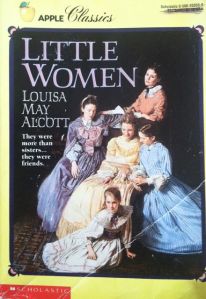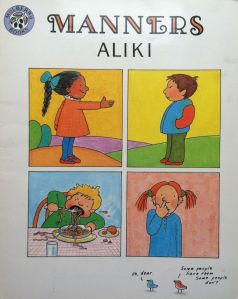This summer I read Little Women out loud to my two daughters. With its occasional mention of a higher power, and regular discussion of how to treat others and what should and should not matter in life, it felt dated — like something of a time capsule. But, to my surprise, I felt a sense of relief reading it too, like some weight had been moved from my shoulders onto the book’s.
Louisa May Alcott published Little Women in 1868/1869. The expectations and norms for women in that period make it a no brainer that bookish, reform-minded, marriage-resistant Jo would become modern readers’ favorite. The political-correct-itude (or lack thereof) of the book notwithstanding, its moralizing and lesson-teaching hit a nerve. A notion runs through the book that one should always be trying to do and be better. And this is something that you don’t see much in kids fiction these days, to the degree and in the manner that it is present here.
It’s not that morality is dead: values and morality are there in modern fiction at all levels — they’re just usually more implicit. Thankfully, contemporary fiction enters complex social and political territory that it never would have years ago. Head-on discussion and directives about what it means to be a “good” person and how to behave are way out of fashion though: in our more secular age, you find conversation of that sort relegated to explicitly religious books.
There are still books around that address behavior — like Aliki’s Manners or Jane Yolen’s How Do Dinosaurs… books — but they are about manners, not morals, and the questions they raise tend to be strictly rhetorical. (There is a developmental piece here, to be sure: Little Women is aimed at an older audience and you can’t expect a solid debate about self-sacrifice among the 3 year old set. Discussion of dinosaur eating habits is much more on target.)
I am a huge believer in progressive, constructivist approaches to learning — in not simply thwunking people over the head with information or ideas. So I was surprised to find this more didactic approach to moral thinking appealing. It seems so old school.
The musings of Mrs. March, the little women, and the narrator regularly refer back to various ‘oughts’ and ‘shoulds’. A typical admonishment from Mrs. March reads:
Have regular hours for work and play, make each day both useful and pleasant, and prove that you undertand the worth of time by employing it well. Then youth will be delightful, old age will bring few regrets, and life become a beautiful success, in spite of poverty.
In reading, I found that such directives of Mrs. March’s, as well as her daughters’ discussions, focused our attention in ways that the morality implicit in characters’ actions or decisions which we are more familiar with does not — and so led us into different sorts of conversations. My progressive leanings aside, I also know from my own experience as a learner that a clear, articulate set of rules or codes is a great thing to bounce your own thoughts off and to use to help figure out what you actually believe.
In the midst of mulling these questions of morality in kidlit I happened to hear an episode of WBUR Boston’s On Point, about morals (or lack thereof) in US football. Guests Steve Almond (author of Against Football: One Fan’s Reluctant Manifesto), David Steele (columnist for Sporting News), and Nate Jackon (former NFL player and author of Slow Getting Up: A Story of NFL Survival from the Bottom of the Pile) talked about myriad ways that the sport and its culture exhibit values that are questionable at best — all driving home the fact that in our consumer culture, concerns about the morality of football take a backseat to consumer desire and market interests. The show reminded: morality is not sexy, is not fun and does not sell. (Except maybe in the land of the televangelist.)
What’s so refreshing about Little Women is not so much the specific values and morals that the books professes, but the fact that it engages in this sort of conversation at all. And while I don’t have plans to rush out to read Pilgrim’s Progress (the Christian allegory is a reference point for the first book of Little Women), it was a nice change to have someone else — some fictional someones — starting these conversations so directly with my kids.


Kids sometimes find a straightforward “here’s what I think” to be comforting, even if they don’t agree with it. Adults do too sometimes. It’s good to know where someone stands.
Yes — it can definitely be reassuring. And helpful. I picked both of my graduate programs in part because they had such clearly articulated agendas and philosophies. No matter whether I fully agreed with them or not.
I know what you mean. It can be a refreshing change of pace to hear some good old-fashioned guidelines for living a good life. I really enjoy your blog and the time you take with interesting topics.
Thanks so much for reading it! I sometimes think that ‘the time I take’ is just ‘a distraction from other writing’ — though mostly writing here is a good way to work things through that I’m mulling anyway.
I heard an episode of Car Talk the other day that featured a bunch of haikus that made me think of you. Wait — here is the link: http://www.cartalk.com/content/car-talk-haiku-8
(You have to read them with a Boston accent.)